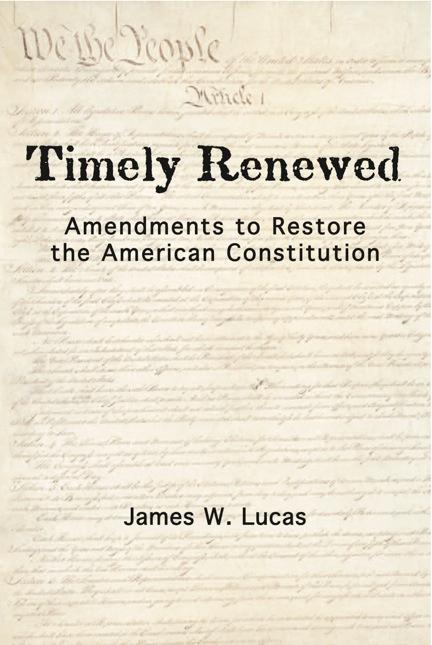A Proposed Amendment to Improve the Process
for Amending the Constitution and Facilitate the
Initiation of Amendment Proposals by the States
Section 1. Article V shall be amended to read in its entirety as follows:
“Section 1: This Constitution may be amended by either: (a) five eighths of both Houses of Congress and five eighths of the States, which approvals by the Congress and the States may occur concurrently, or (b) two thirds of the States with a majority of the nation’s population as determined by the most recent Enumeration made pursuant to Article I Section 2 of this Constitution prior to the completion of the procedures set forth in this Section. If the first approval of a proposed amendment is by States, at least five States must approve the proposed amendment within a period of not more than one hundred twenty calendar days. Each State may determine whether actions under this article are to be by its legislature or by referendum.
Section 2: All approvals of any proposed amendment shall expire if the proposed amendment has not been fully approved (a) for proposed amendments initiated by the Congress seven calendar years after the vote of whichever House of Congress was the first to approve it, or (b) for proposed amendments initiated by States nine calendar years after the first State approval.
Section 3: The operative text of any amendment must be approved with identical wording.
Section 4: Congress and any State may rescind approval of a proposed amendment except during the thirty calendar days prior to the date upon which the proposed amendment is fully approved under Section 1 of this article.
Section 5: An amendment shall be valid to all intents and purposes as part of this Constitution upon completion of the procedures set out in Section 1 of this article unless the amendment itself sets a future effective date. An approval or rescission of an approval of a proposed amendment shall be effective upon the completion of Congress’ or a State’s procedures for ordinary legislative or ballot actions, or as the legislature or a State’s constitution may otherwise provide, except that no executive assent, veto or other action shall apply to any action under this article other than the conduct and certification of referenda hereunder.
Section 6: Congress’ and each State’s approvals and rescissions of approvals of proposed amendments must be promptly transmitted to the Speaker of the House of Representatives, who must within seven calendar days of receipt: (a) publicly post all such actions, (b) transmit them to the Senate and the legislatures of the States, and (c) declare the enactment of an amendment upon fulfillment of the requirements of this article. In the event of any failure to perform an executory action under this article, upon the application of any member of Congress, or with respect to any State any member of that State’s legislature, the courts constituted under Article III of this Constitution must decree such action to be effected.
Section 7: No amendment shall deprive any State of its equal suffrage in the Senate without its consent.”
Section 2. The textual amendments provided by this article shall be incorporated in all official publications of this Constitution. Congress is authorized determine whether this Section 2 and the previous text of this article shall also be included in such official publications.
 The Amendment Amendment is discussed in more detail in my new short book, Are We The People? How We the People Can Take Charge of Our Constitution. It discusses each provision of the Amendment Amendment and shows how this reform of our current amendment process will make the People the ultimate arbiters of the Constitution’s meaning and permit consideration of amendment proposals which are important to both progressives and conservatives. The new 2025 edition of Are We The People? is available in e-book format for only $2.99, from Nook and Kindle, in print from Amazon, Barnes & Noble and other online outlets for only $5.99, and as an audiobook from Audible.
The Amendment Amendment is discussed in more detail in my new short book, Are We The People? How We the People Can Take Charge of Our Constitution. It discusses each provision of the Amendment Amendment and shows how this reform of our current amendment process will make the People the ultimate arbiters of the Constitution’s meaning and permit consideration of amendment proposals which are important to both progressives and conservatives. The new 2025 edition of Are We The People? is available in e-book format for only $2.99, from Nook and Kindle, in print from Amazon, Barnes & Noble and other online outlets for only $5.99, and as an audiobook from Audible.


